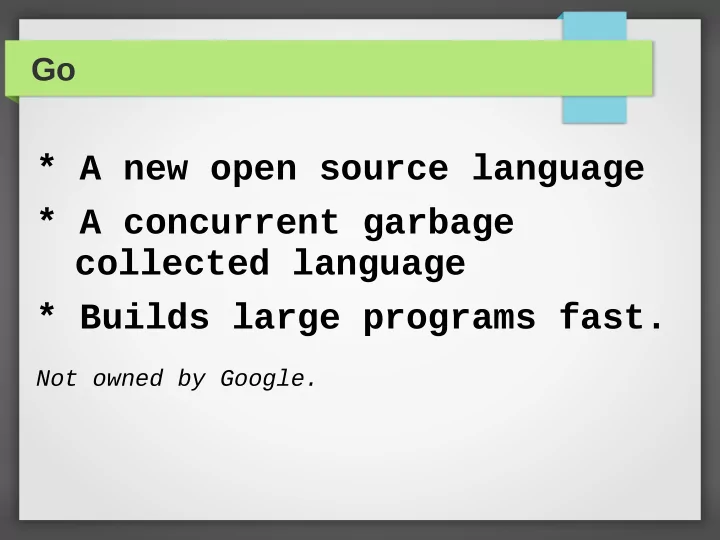

Go * A new open source language * A concurrent garbage collected language * Builds large programs fast. Not owned by Google.
Go ~ Fast “Go compilers produce fast code fast. Typical builds take a fraction of a second yet the resulting programs run nearly as quickly as comparable C or C++ code.”
Go ~ Safe “Go is type safe and memory safe. Go has pointers but no pointer arithmetic. For random access, use slices, which know their limits.”
Go ~ Concurrent “Do not communicate by sharing memory. Instead, share memory by communicating.” ~ “Go promotes writing systems and servers as sets of lightweight communicating processes, called goroutines, with strong support from the language. Run thousands of goroutines if you want—and say good-bye to stack overflows.”
Go ~ Open Source BSD licence code Creative commons attribution documentation Majority of committers are outside Google
Go ~ Fun “Go has fast builds, clean syntax, garbage collection, methods for any type, and run-time reflection. It feels like a dynamic language but has the speed and safety of a static language. It's a joy to use. ”
Go ~ Deeper ✔ Interfaces ~ pure classless duck-typing ✔ Reflection ~ strong static types ✔ Higher-order functions & closures ✔ Concurrency ~ CSP ✗ Immutability ✗ Generics
Go ~ Example 1 ● Hello world ● Packages ● Imports ● Main entry point ● UTF8 encoding package main import "fmt" func main() { fmt.Println("Hello, 世界 ") }
Go ~ Interfaces 1 A type implements an interface by defining the required methods. (there is no Point 2) 2 ● Example: Printing Stringers ● Docs: fmt.Stringer
Go ~ Interfaces 2 ● Eg. http://golang.org/pkg/time/#Weekday ● Eg. http://play.golang.org/p/FBIEp6OoXP ● No ' implements ' declarations – These types don't declare that they implement fmt.Stringer – They just do, simply by declaring a String() string method. ● Go interfaces are simple, lightweight entities. – Very little coupling – Can be added later
Go ~ IO Writer ● Writing bytes: io.Writer type Writer interface { Write(p []byte) (n int, err error) } ● Example: os.Stdout ● Example: 32bit CRC ● Example: using MultiWriter
Go ~ IO Reader ● Reading bytes: io.Reader type Reader interface { Read(p []byte) (n int, err error) } ● os.File ● bufio.Reader ● net.Conn ● Compress/gzip, crypto/tls, … ● bytes.Buffer
Go ~ Reflection ● Type information & basic operations are available at runtime ● A little goes a long way – Only needed in one or two key places ● Example – implementation of Printf as ordinary Go code ● Lots of flexibility, e.g for JSON and XML processing – Step 1: printing a struct – Step 2: JSON and XML marshalling – Step 3: generalisation with higher-order function ● note Lang didn't need anything clever to map it to JSON or XML ● JSON and XML marshalling libs contain some reflection code
Go ~ Web Crawl ● Example: toy web crawler counting webpage bytes ( ex10webcrawl1 ) Python 20806 [2.95s] Ruby 10330 [1.94s] Scala 46318 [0.71s] Go 6400 [0.42s] 6.01s total ● But we could make these requests in parallel and speed it all up...
Go ~ Concurrency ● Parallelism – Running multiple things at the same time ● Concurrency – A way to deal with multiple things simultaneously – The coordination of parallel computations ● Go provides both but the emphasis is on concurrency
Go ~ Concurrency ● Goroutines let you run multiple computations simultaneously ● Channels let you coordinate the computations, by explicit communication.
Go ~ Concurrent Web Crawl ● Step 1: toy web crawler with goroutines … and a rubbish sleep at the end ( ex11webcrawl2 ) ● Step 2: add some channels. No delays needed – Nice! ( ex12webcrawl3 ) ● Step 3: what if we want to give up after n seconds? Simple: use a timeout with a select ( aka. 'alternative' in CSP speak ) ( ex13webcrawl4 ) ✔ No callbacks ✔ No condition variables, mutexes, semaphores although they exist under the hood in the runtime • ✔ What you see is what you get – simple!
Go ~ closing remarks ● Go ~ a fast, fun and productive language ● V1.1.2 released Aug 2013 ● Choice of two compilers coordinated by spec ● Medium-sized community of open-source add-on apis ● Eclipse & IntelliJ plugins ('Goclipse' is currently better) ● Testing, debugging, profiling tools – quite usable but not very snazzy yet. ● See A Tour of Go, Russ Cox (the basis of this talk) ● Start here: – http://tour.golang.org/ – http://golang.org/doc/effective_go.html – https://bitbucket.org/rickb777/go-talk
Recommend
More recommend